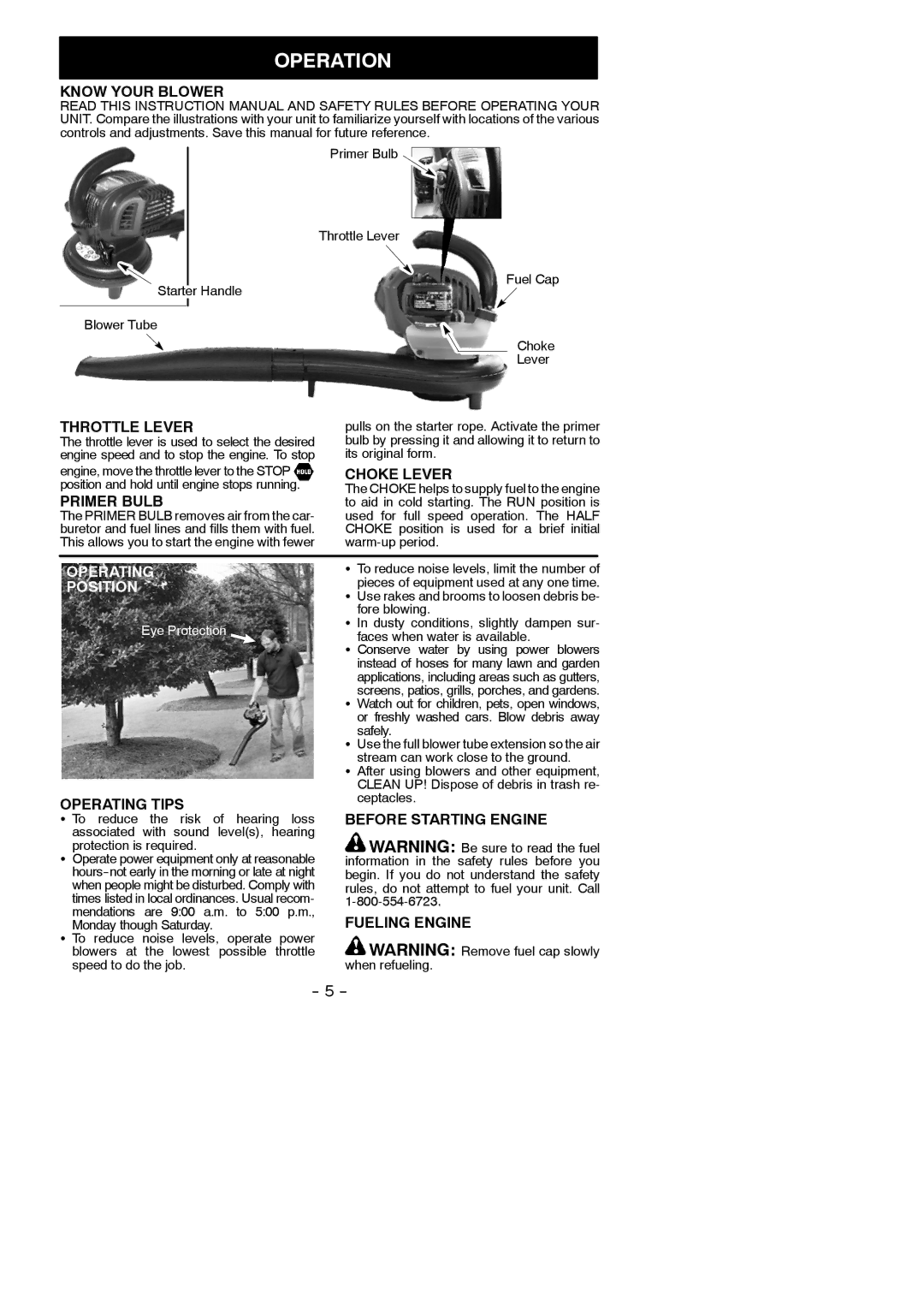
OPERATION
KNOW YOUR BLOWER
READ THIS INSTRUCTION MANUAL AND SAFETY RULES BEFORE OPERATING YOUR UNIT. Compare the illustrations with your unit to familiarize yourself with locations of the various controls and adjustments. Save this manual for future reference.
|
|
|
| Primer Bulb |
|
|
| ||
|
|
|
|
|
|
| |||
|
|
|
|
|
|
|
| ||
|
|
|
| Throttle Lever | |||||
|
|
|
|
|
|
| Fuel Cap | ||
| Starter | Handle |
|
|
|
|
|
| |
|
|
|
|
|
|
|
|
| |
Blower Tube |
|
|
|
|
| ||||
|
|
|
|
|
|
| Choke | ||
|
|
|
|
|
|
| Lever | ||
THROTTLE LEVER | pulls on the starter rope. Activate the primer | ||||||||
The throttle lever is used to select the desired | bulb by pressing it and allowing it to return to | ||||||||
engine speed and to stop the engine. To stop | its original form. | ||||||||
engine, move the throttle lever to the STOP | CHOKE LEVER | ||||||||
position and hold until engine stops running. | The CHOKE helps to supply fuel to the engine | ||||||||
PRIMER BULB | to aid in cold starting. The RUN position is | ||||||||
The PRIMER BULB removes air from the car- | used for full speed operation. The HALF | ||||||||
buretor and fuel lines and fills them with fuel. | CHOKE position is used for a brief initial | ||||||||
This allows you to start the engine with fewer | |||||||||
|
|
|
| ||||||
OPERATING | S | To reduce noise levels, limit the number of | |||||||
POSITION | S | pieces of equipment used at any one time. | |||||||
|
|
|
| Use rakes and brooms to loosen debris be- | |||||
|
|
|
|
| fore blowing. | ||||
Eye Protection | S | In dusty conditions, slightly dampen sur- | |||||||
| faces when water is available. | ||||||||
|
|
|
|
| |||||
|
|
|
| S Conserve water by using power blowers | |||||
|
|
|
|
| instead of hoses for many lawn and garden | ||||
|
|
|
|
| applications, including areas such as gutters, | ||||
|
|
|
|
| screens, patios, grills, porches, and gardens. | ||||
|
|
|
| S | Watch out for children, pets, open windows, | ||||
|
|
|
|
| or freshly washed cars. Blow debris away | ||||
|
|
|
|
| safely. | ||||
|
|
|
| S Use the full blower tube extension so the air | |||||
|
|
|
|
| stream can work close to the ground. | ||||
|
|
|
| S | After using blowers and other equipment, | ||||
|
|
|
|
| CLEAN UP! Dispose of debris in trash re- | ||||
OPERATING TIPS |
| ceptacles. | |||||||
BEFORE STARTING ENGINE | |||||||||
S To reduce the risk of hearing loss | |||||||||
associated with sound level(s), hearing |
| WARNING: Be sure to read the fuel | |||||||
protection is required. |
| ||||||||
S Operate power equipment only at reasonable | information in the safety rules before you | ||||||||
begin. If you do not understand the safety | |||||||||
when people might be disturbed. Comply with | rules, do not attempt to fuel your unit. Call | ||||||||
times listed in local ordinances. Usual recom- |
|
| |||||||
mendations are 9:00 a.m. to 5:00 p.m., | FUELING ENGINE | ||||||||
Monday though Saturday. | |||||||||
S To reduce noise levels, operate power |
| WARNING: Remove fuel cap slowly | |||||||
blowers at the lowest possible throttle |
| ||||||||
speed to do the job. | when refueling. | ||||||||
